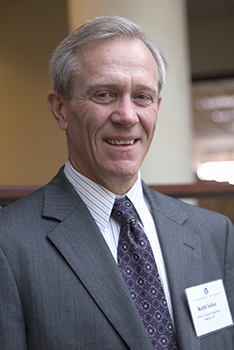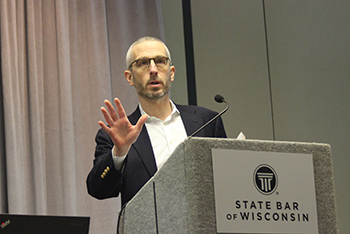
Pausing a moment for a photo together are Young Lawyers Division representatives Deanne Koll of New Richmond and Amanda Ashley of Wauwatosa, with YLD President-elect Ryan Blay, Kenosha.
Visit the State Bar of Wisconsin’s Facebook page for more photos of this event, or click here.
Jan. 30, 2015 – The State Bar of Wisconsin’s Board of Governors backed a petition for mandatory e-filing, discussed a petition on e-banking for trust accounts, created a standing committee on diversity and inclusion, and supported updates and changes to Wisconsin’s ethics rules, among other actions at today’s board meeting in Madison.
At its last meeting December, the 52-member board discussed an e-filing petition (14-03) that was submitted to the Wisconsin Supreme Court by the Committee of Chief Judges in October 2014. Today, the board supported the petition, which requires all lawyers in Wisconsin to file court documents electronically at the circuit court level.
The petition is intended to create greater efficiencies in the court system. The proposal calls for a three-year county-by-county rollout plan, starting in 2016, with full participation from all counties by the end of 2018. The filing fee would be between $5 and $6 per case, but the fee is waived for cases involving indigent clients, as well as cases appointed to public defenders and private attorneys who take public defender cases. Government lawyers, such as prosecutors, are also exempt from the e-filing fee.
The board also supported a related petition (14-04), submitted by the CCAP Steering Committee, which requires parties to redact “protected information” from court documents before e-filing. Such information includes Social Security and driver license numbers, and financial and banking information.
The e-filing petition is scheduled for a public hearing March 17. The redaction petition is scheduled for a public hearing April 28.
Board Supports Petition on Ethics Rule Changes
The board unanimously supports a petition to amend the Wisconsin Professional Rules of Conduct for Attorneys. The State Bar’s Professional Ethics Committee drafted and recommended the petition, which reflects recent approved changes to the ABA Model Rules of Professional Conduct as recommended by the ABA Ethics 20/20 Commission.

From left: District 9 Gov. Anthony Gray of Madison, with former State Bar President Steven Levine, Madison, and GLD representative Kathleen Chung, Madison.
Wisconsin’s ethics rules are based on the ABA Model Rules with some differences specific to Wisconsin. The Ethics Committee, which studied the rules for two years, believes changes are necessary to address technology, outsourcing, disaggregation of legal services, and other modern day factors that are affecting the practice of law.
The petition will be submitted to the Wisconsin Supreme Court this month. Look for an in-depth explanation of the proposed changes in the Feb. 4 edition of InsideTrack.
For a brief overview of the petition’s recommended changes, see “Highlights of Proposed Changes to the Rules of Professional Conduct for Attorneys.”
Board Discusses E-Banking Trust Account Petition
The board discussed a petition (14-07) to expand the use of electronic transactions involving lawyer trust accounts. The Office of Lawyer Regulation (OLR) filed the petition with the Wisconsin Supreme Court in December and is seeking State Bar support.
OLR Director Keith Sellen appeared at the meeting to urge support for petition, noting the increasing use of electronic transactions in banking procedures and the lawyers’ handling of funds for clients and third persons through their trust accounts.
“It was important for OLR to put a group together to study what changes ought to be made to the trust account rule that would enable lawyers to better serve their clients and would allow for OLR to adequately protect the public,” Sellen said.
The OLR regulates deposits and disbursements through trust accounts, and electronic trust account transactions are only allowed in limited circumstances. As the technology for these transactions evolves, OLR recognizes the need to modernize the regulations, Sellen said. The trust account rules were last updated seven years ago.
“Under the petition, there would be an expansion of the use of electronic transactions for lawyer trust accounts. The rules would also provide appropriate safeguards to assure the public that the funds there are safe and will be accounted for,” Sellen noted.

OLR Director Keith Sellen discusses OLR’s petition to amend trust account rules to provide for use of electronic transactions for trust accounts.
Board Establishes Standing Committee on Diversity and Inclusion
The board voted unanimously to establish, through changes to State Bar bylaws, a standing Diversity and Inclusion Oversight Committee.
The standing committee will carry out the State Bar’s commitment and goals for diversity and inclusion in the legal profession. It will advise, facilitate, and monitor the State Bar’s diversity and inclusion efforts, recommend metrics to assess the State Bar’s progress, maintain records, and share and collect information on diversity and inclusion.
Past-president Patrick J. Fiedler fist created a Diversity Task Force in 2012 to determine the State Bar’s role in promoting and furthering diversity and inclusion within Wisconsin’s law schools, the State Bar organization, and the legal profession.
Milwaukee County Circuit Court Judge Carl Ashley chaired the task force, which released its report and recommendations in 2014. The State Bar Board adopted the report, which serves as a blueprint for State Bar efforts towards diversity and inclusion.
One of the report’s recommendations was to establish a standing committee to assist, coordinate, and facilitate the incorporation of diversity and inclusion efforts, and to ensure that the State Bar’s implementation efforts are carried out.
Board Supports Strengthening the State Bar/Section Relationship
The board adopted a report from the Task Force on Strengthening the State Bar/Section Relationship, which contains recommendations for improving the relationship between the State Bar organization and its 24 sections.
Recommendations establish a framework to gather feedback, provide input, and generate reasonable and workable approaches for addressing concerns.
For instance, the report recommends more collaboration between sections and State Bar of Wisconsin PINNACLE® to deliver more flexible continuing legal education programs, as well as incorporating sections into the State Bar budgeting process.

Sherry Coley, State Bar secretary, of Green Bay addressed the Board of Governors.
State Bar Executive Director George Brown and President Robert Gagan will refer specific recommendations to appropriate groups for continued work on these efforts.
Board Supports Lobbying on Criminal Procedure Code Rewrite
The board unanimously supports lobbying efforts to represent State Bar interests concerning the Wisconsin Judicial Council’s efforts to rewrite the Criminal Procedure Code, a project the Judicial Council has been working on for the past 20 years.
The comprehensive changes have been incorporated into a bill that is expected to be introduced during the 2015-16 legislative session. The board’s Policy Committee urged board support, which will allow the State Bar to continue its lobbying efforts on the bill.
The board also agreed to reaffirm, modify, or sunset certain State Bar policy positions on the “delivery of legal services” and the “administration of justice.”
The board modified policy positions on funding for civil legal services, civic instruction in schools, open records, and judicial independence. The board voted to sunset outdated policy positions on gun violence, group legal service plans, court assessments, supreme court conferences, access to county records, and jurisdictional tampering.
Board Considers Policy Positions on Law School Debt and Judicial Authority
The State Bar board discussed whether to adopt a policy position to support legislative efforts to reduce the cost of legal education and provide loan repayment assistance programs where appropriate. The policy recognizes the increased costs of legal education and the financial challenges that lawyers are facing upon graduation from law school.

State Bar Ethics Counsel Tim Pierce addresses the board on proposed changes to the rules of professional conduct.
The board also discussed adopting a policy position to oppose any effort to usurp the superintending and administrative authority of the Wisconsin Supreme Court, which recognizes the judicial branch as a co-equal branch of government.
The State Bar’s Policy Committee, which recommends the policies, requested that the board take action to adopt the policies at the next board meeting in April.
State Bar Adopts Keller Dues Reduction Amount for FY 2016
The board approved a Keller dues reduction amount of $5.25 for FY 2016. Under Keller v. State Bar of California, 496 U.S. 1 (1990), the State Bar may not use compulsory dues of any member who objects to activities which are not reasonably intended for the purpose of regulating the legal profession or improving the quality of legal services.
As it does each year, the State Bar determined which activities were subject to the Keller dues reduction. An amount of $104,964 was determined as nonchargeable to mandatory dues. That number was divided by the anticipated 20,661 full dues-paying members for fiscal year 2016, resulting in a calculation of $5.08 (rounded up to $5.25).
Other Business
The board approved the Appellate Practice Section’s request to amend the section’s bylaws, which would allow the section to conduct elections by electronic ballot. The changes will also allow greater flexibility in scheduling the section’s annual meeting.
Upon request, interested members may obtain a copy of the minutes of each meeting of the Board of Governors. For more information, contact State Bar Executive Coordinator Jan Marks byemailor by phone at (608) 250-6106.
